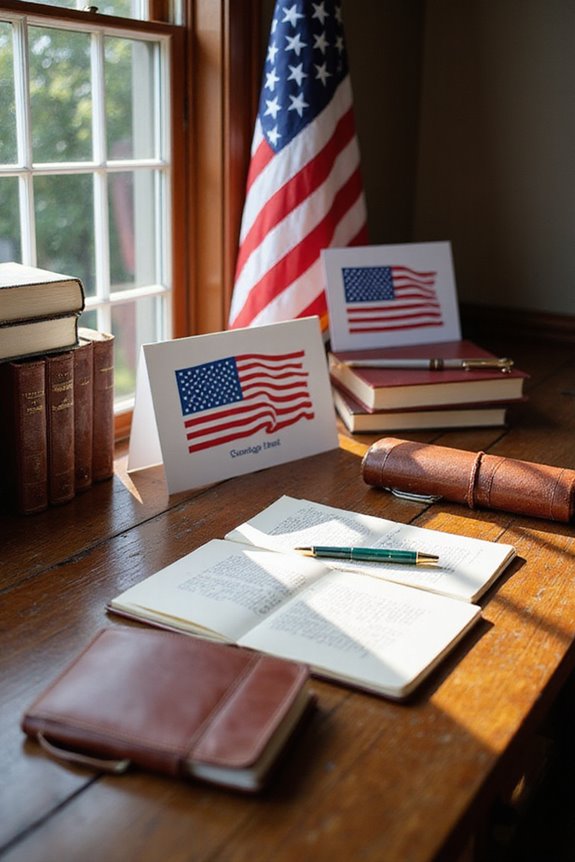Political letter writing kits enhance communication between us and our elected officials, shaping local and state decisions. Key features of effective kits include:
- Standardized materials for professionalism
- Quality pens for readability
- Clear instructions and message templates
Best practices emphasize maintaining a one-page structure and using respectful language. While these kits boost voter engagement, personalization can be a challenge. If you want to understand how these components strengthen community involvement, we’ve got more insights ahead.
Key Takeaways
- Political letter writing kits include standardized materials such as campaign letterhead, envelopes, and quality ink pens for professionalism.
- Effective kits provide background information, message templates, and formatting guidelines to ensure clarity and consistency in letters.
- Best practices recommend a one-page structure, respectful tone, and clear requests to enhance the impact of the letters.
- Personalization is limited by strict neutrality guidelines, which may reduce creativity and spontaneity in communications.
- Measuring campaign impact through engagement metrics and tailoring messages to demographics can improve voter engagement effectiveness.
Importance of Political Letter Writing
Political letter writing holds significant importance in today’s democratic landscape. This form of political engagement allows us to communicate our opinions directly to elected officials. By participating in letter writing campaigns, we can influence political decisions at local and state levels, demonstrating the political cost of certain positions. Elected officials closely monitor the volume and content of letters, recognizing them as indicators of voter intensity. In addition, letters provide qualitative insights that enrich understanding of public sentiment. A recent analysis of political engagement strategies revealed that well-timed, informed letters can significantly amplify our concerns regarding the fragility of democracy. A 2020 study showed that hand-written letters increased voter turnout by about 0.8 percentage points nationwide. Consequently, letter writing not only expresses our views but also strengthens democratic linkages, ensuring our voices are heard and our leaders remain accountable.
Components of Effective Letter Writing Kits
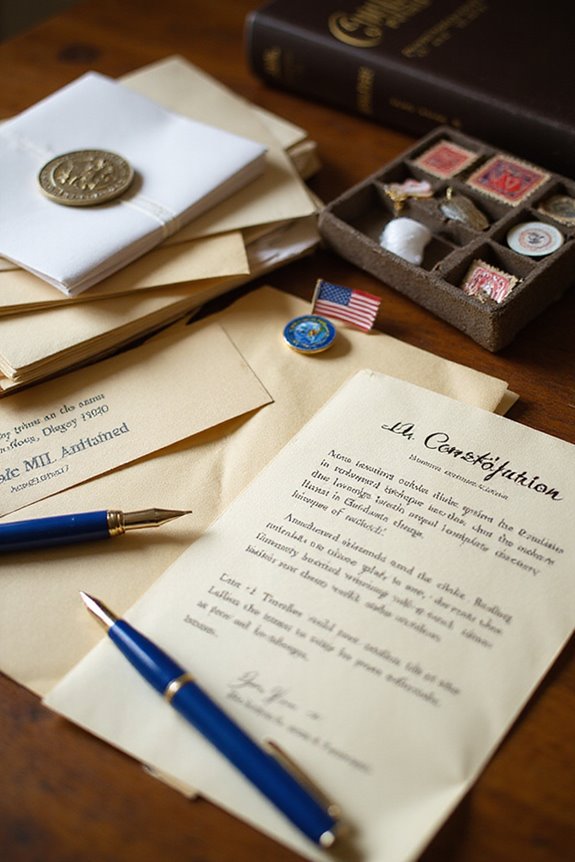
When creating effective letter writing kits, it’s crucial to include essential components that facilitate engagement and streamline the writing process. Here are the key elements we should consider:
- Standardized materials: Utilize campaign letterhead and envelopes designed for a professional appearance.
- Writing tools: Provide quality ink pens in blue or black for readability. Quality writing instruments can enhance the overall writing experience.
- Background information: Include concise briefs summarizing issues and explicit templates for message consistency. Vote Forward offers letter templates that can help volunteers effectively communicate their messages.
- Formatting guidelines: Emphasize readability with a minimum font size of 12 points and short paragraphs.
- Engagement enhancements: Encourage creativity with hand-drawn highlights, thematic designs, and small giveaways.
- Instructions: Offer clear guidance on addressing envelopes and maintaining message neutrality.
These components will guarantee our letter writing kits are effective and impactful.
Best Practices for Crafting Political Letters
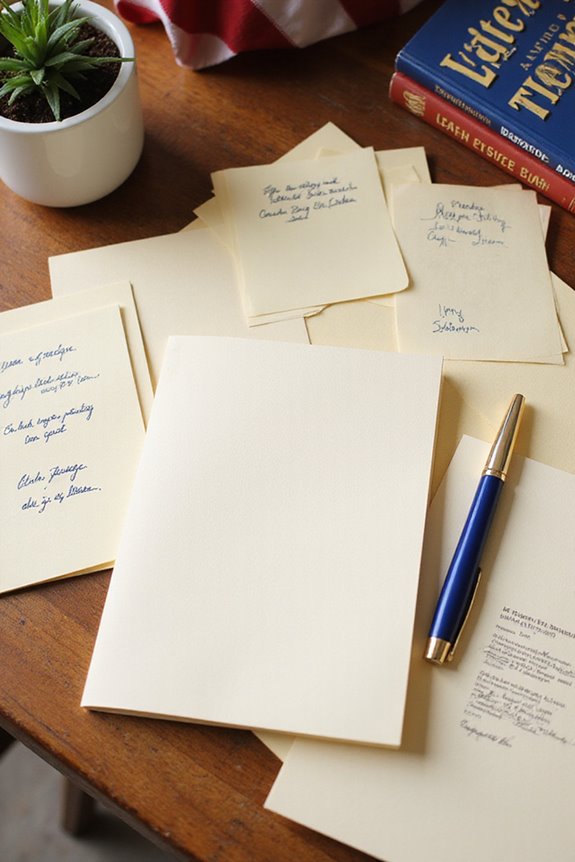
Crafting effective political letters requires attention to several best practices that can enhance their impact and clarity. Here’s how we can do that:
- Letter Structure: Keep letters to one page, focusing on a single issue. Start by identifying ourselves as constituents and state the specific legislation early on. Remember that a well-crafted letter can serve as part of a letter-writing campaign that demonstrates public concern over an issue. Understanding the role of political institutions can also strengthen our arguments and provide context for our requests.
- Tone Considerations: Maintain a respectful tone throughout, avoiding partisan language. Use straightforward language to guarantee clarity.
- Personalization: Incorporate real-life examples and community quotes to support our argument. Limit points to three strong arguments for effectiveness.
- Call to Action: Clearly state our request at the beginning and restate it at the end, thanking the recipient to reinforce our message.
Social Engagement Through Letter Writing Events
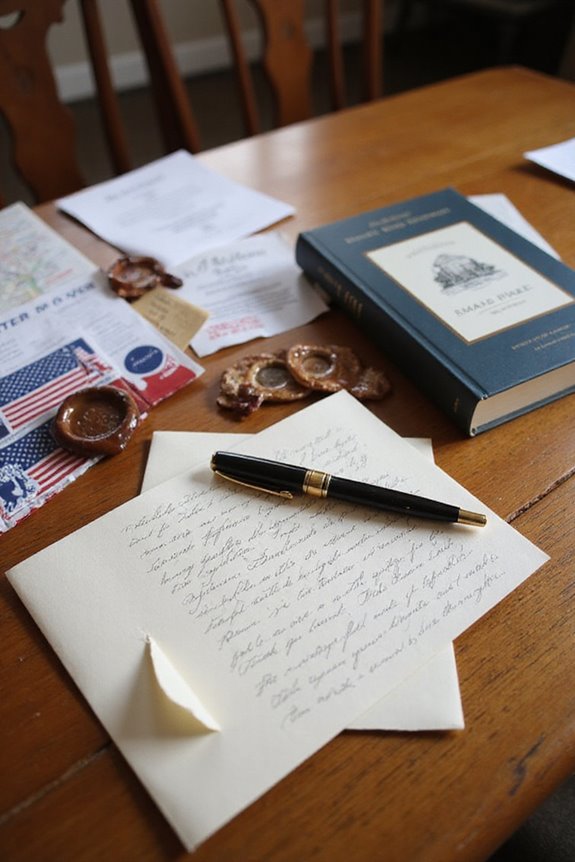
Engaging in letter writing events can greatly enhance community involvement in the democratic process. These organized gatherings foster community connections, bringing together diverse volunteers to collectively address civic responsibility.
Key benefits of participating in these events include:
- Increased Engagement: Large-scale efforts have mobilized hundreds of thousands, creating significant civic involvement. Research has shown that hand-written letters can increase voter turnout by close to 1 percentage point. Additionally, using high-quality stationery supplies can enhance the appeal of letters, making them more effective.
- Social Interaction: Group writing encourages dialogue about political issues, strengthening community ties.
- Grassroots Mobilization: Events empower citizens to engage collectively, serving as entry points for sustained political activism.
- Impact on Voter Behavior: Handwritten letters have proven to persuade voters, particularly in close elections.
Strategic Use of Letter Writing in Campaigns
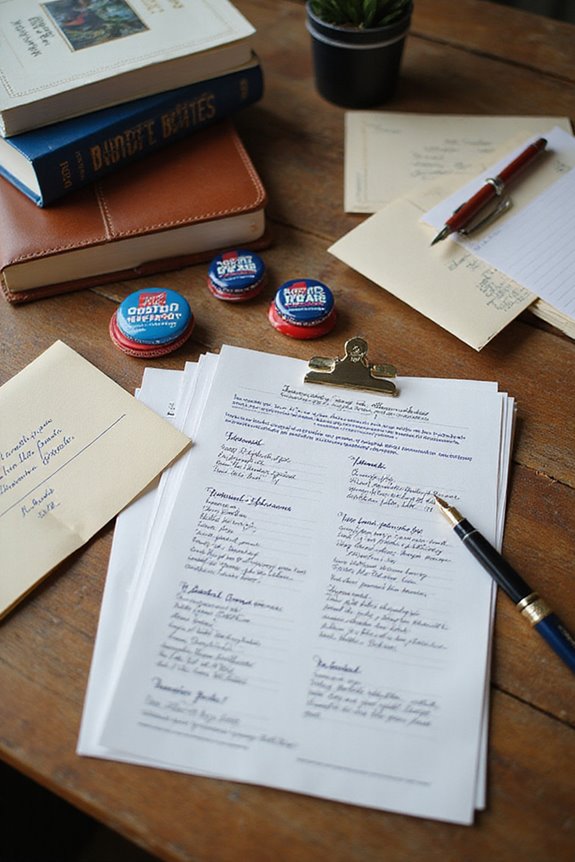
Strategically employing letter writing in political campaigns can greatly enhance voter mobilization efforts. Hand-written letters have been proven to increase voter turnout by approximately 0.8 to 1 percentage point. This low-tech approach effectively cuts through the digital noise, making personal connections with voters.
- Targeted Outreach: Using vetted mailing lists allows campaigns to reach specific voter segments. Additionally, incorporating political postcards into outreach strategies can further engage voters and enhance message delivery.
- Volunteer Coordination: Large networks of volunteers can send millions of letters, considerably amplifying impact. CHN’s participation in the Vote Forward campaign has demonstrated the potential for letter writing to significantly engage underserved communities.
Combining letter writing with other get-out-the-vote strategies guarantees a thorough approach to mobilization. The psychological effect of receiving a physical letter fosters a sense of civic duty and personal accountability. Overall, integrating letter writing into our campaigns can lead to measurable increases in voter participation.
Limitations of Political Letter Writing Kits
While letter writing can be an effective tool in political campaigns, it’s important to recognize the various limitations that come with using political letter writing kits.
- Template Restrictions: Many templates require us to avoid explicit mentions of candidates or political parties, limiting our messaging options.
- Personalization Challenges: Personalizing letters can be difficult due to strict neutrality guidelines, which may dilute strong political messaging. Additionally, the use of political mail can be a more effective way to reach voters directly.
- Content Limitations: Pre-printed templates can stifle creativity and spontaneity in our communications.
- Logistical Constraints: Preparing and coordinating letter writing kits can slow production and increase the chance of errors.
These limitations may hinder the overall effectiveness of our letter-writing campaigns and reduce voter engagement, making careful planning essential for success.
Enhancing Community Involvement Through Letters
Letters play an essential role in enhancing community involvement, as they foster direct communication between citizens and their representatives. Engaging in letter campaigns strengthens community connections by encouraging dialogue around shared political issues.
- Personalized letters have proven effective in increasing voter turnout, particularly in smaller-scale elections. Higher income and education levels correlate with increased participation in political activities, emphasizing the importance of outreach through letter writing to diverse demographics.
- Youth engagement in letter writing correlates with a boost in overall political efficacy and civic participation.
- Letters serve as a tangible means for individuals to contribute to their community, enhancing awareness of local elections.
- Campaigns designed for easy volunteer participation amplify local voices and support sustained community engagement.
Through letter writing, we can cultivate a culture of civic responsibility, ensuring our communities are informed and active in decision-making processes.
Measuring the Impact of Political Letters
Understanding the measurable outcomes of political letter writing campaigns is key to evaluating their overall effectiveness. Here’s how we can measure their impact:
- Voter Turnout: Campaigns in the 2020 elections showed nearly a 1 percentage point increase in turnout, significant compared to traditional efforts. Letter-writing campaigns also resulted in approximately 126,000 additional votes across 21 states.
- Demographic Influence: Young voters respond better to letters, while Democratic voters in Red states show greater influence.
- Engagement Metrics: We can quantify impact through response rates, website traffic spikes, and polling changes after mailings.
- Personal Touch: Handwritten letters foster trust and encourage voter engagement, increasing the likelihood of turnout.
- Strategic Targeting: Tailoring messages based on voter demographics enhances effectiveness, ensuring we connect with the right audiences.
These factors collectively help us assess the influence of political letters on voter behavior.
Frequently Asked Questions
How Do I Get Started With Political Letter Writing?
To get started with political letter writing, we can use effective communication by applying letter writing techniques. Let’s focus on a single issue, be concise, and personalize our letters to connect with our representatives.
Are There Age Restrictions for Participating in Letter Writing Campaigns?
When considering age eligibility for letter writing campaigns, we find youth participation is often welcomed. While some restrictions exist, many organizations encourage young voices, fostering engagement and empowering the next generation to express their opinions.
Can I Use My Own Stationery for Writing Letters?
Yes, we can definitely use our own personalized stationery for writing letters. While creative designs are fun, keeping professionalism in mind is key. Let’s choose quality materials that reflect seriousness and clarity in our correspondence.
How Can I Ensure My Letters Stay Anonymous?
To guarantee our letters stay anonymous, we can utilize anonymous mailing services and prioritize digital privacy by deleting metadata before sending. This way, we maintain our confidentiality while still making our voices heard.
What Should I Do if I Receive a Response to My Letter?
When we receive a response to our letter, we should evaluate the response options carefully. If it’s unclear, a polite letter follow up can clarify our concerns and guarantee our voices are heard effectively.






